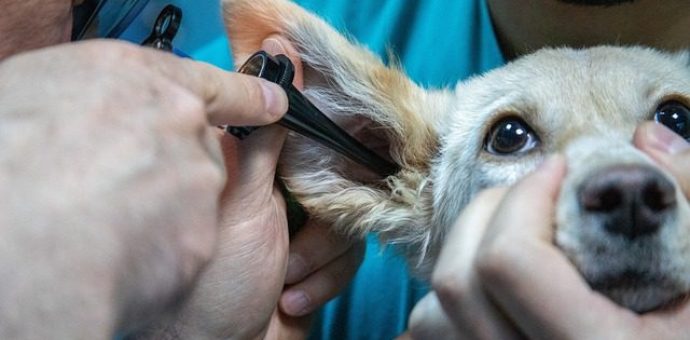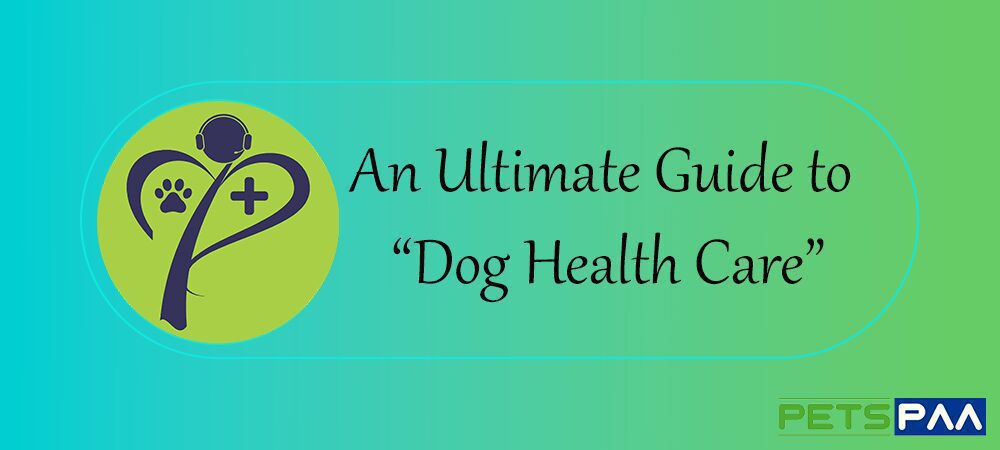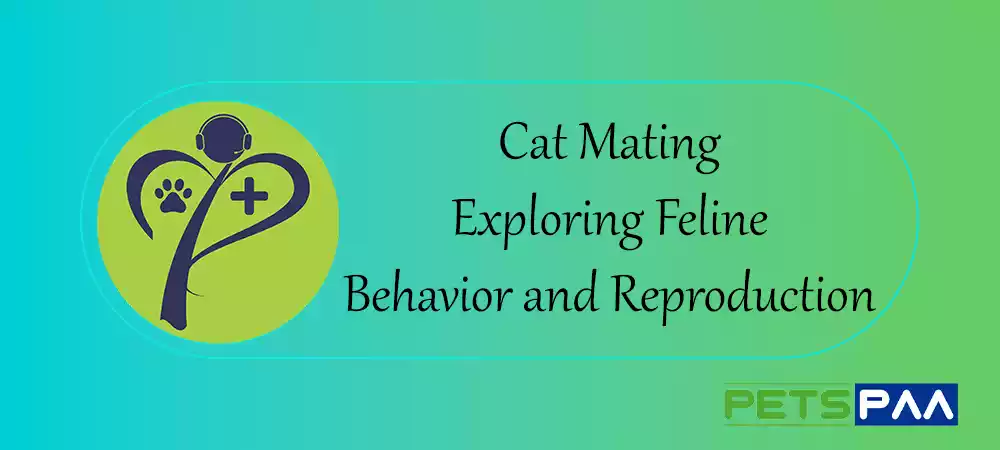Dear Pet Parents,
This “Ultimate Guide to Dog Health Care” is for you to explore. Everything that you require to keep your dog happy and healthy, from head to tail, can be found right here. These dog health care tips is filled with useful advice to help you keep your dog in good hands, whether you’re a novice or an experienced dog owner.
Let’s start by discussing the fundamentals of dog primary health care. Any dog should have regular checkups at the vet, since they may identify any possible health concerns early on.
For them to be healthy overall, you must feed your dog a nutritious, well-balanced diet, give them lots of exercises, and keep up with their immunizations. But maintaining your dog’s health goes beyond only warding off disease; it also involves fostering their general well-being.
In order to preserve their physical health, they must frequently brush their teeth, trim their nails, and care for their coat. In order to keep them happy and pleased, it is also essential to provide them with lots of cerebral stimulation via training and fun.
Therefore, you’ve come to the proper location if you want to learn more about eating and nutrition, exercise or physical activity, dental care, preventative measures, or simply some common health concerns. So take the seat, be relax and let’s get started!

I. Introduction
Dogs are many people’s beloved family members and faithful companions. Understanding the fundamentals of dog health care is crucial if you want to keep your furry buddy happy and healthy. PetsPaa dog health care tips, preventive treatment and regular examinations with the vet are essential for preserving your dog’s general health.
Just as people do, dogs need the right diet, exercise, dental care, and preventative measures to stay healthy. These issues will be covered in depth in this blog article, along with advice on how to provide your dog with the best care possible.
Here we will provide you important advice on how to maintain your dog’s health, such as the right vaccination schedules, flea and tick prevention methods, and heartworm prevention measures.
We’ll talk about the value of regular visits and preventative care, as well as other crucial subjects like food and nutrition, exercise and physical activity, dental care, and typical health problems that dogs may encounter.
Through this blog post, we as “Team PetsPaa” hope to provide dog owners with the information and resources they need to provide the best care for their canine companions. So whether you’re a novice or an experienced dog owner, keep reading to find out more about how to take care of a dog for beginners, how to keep your pet happy and healthy.

II. Nutrition and Feeding
A balanced diet is essential to maintain the health care of your dog. To ensure that your dog has the energy and vigor they need to live a long, healthy life, it is essential to provide them with the dog healthy food and right nourishment.
Kibble, wet food and raw food are just a few of the alternatives on the market when it comes to selecting food for your dog. Dry food sometimes referred to as “kibble”, is a preferred choice for many dog owners since it is convenient and easy to store.
On the other hand, wet food is often more appealing and may be an excellent option for dogs that are fussy eaters or who have dental problems.
Raw food diets are also becoming more popular since they are thought to replicate a dog’s natural diet and may provide a number of advantages, including improved dental health, higher digestibility, and shinier fur. these are the type of foods dogs can eat.
There are a few things to take into account when deciding on the best kind of food for your dog, such as their age, amount of exercise, and health issues. Dogs with health issues could need a particular kind of food, and puppies and elderly dogs may have different nutritional requirements than adult dogs. We understand how valuable every pet is.
Overall, giving your dog a balanced diet is essential for its health and well-being. To choose the best choice for your pet buddy, take the time to investigate several kinds of food and speak with your veterinarian.

III. Physical activity and exercise
Exercise and physical activity is very crucial for dogs. Dogs should engage in regular physical exercise to be fit and happy, maintain a healthy weight and avoid obesity. Exercise is good for dogs’ bodies, but it’s also good for their minds and emotions, keeping them calm and well-behaved.
Dogs may engage in a variety of exercise activities, such as walks, runs, playing and agility training. All ages of dogs benefit from walks, which are also a wonderful opportunity to strengthen your relationship with your pet and enjoy some fresh air.
Breeds that are more athletic, like retrievers and herding dogs, may benefit from running. Dogs like playing games like fetch and tug-of-war to burn off energy and these activities may also help you and your dog get closer. Like obstacle courses, agility training may be a fun way to intellectually and physically push your dog.
Depending on the dog’s breed and age, different breeds need different amounts of exercise. Dogs should generally exercise for at least 30 minutes a day, although bigger breeds and types with high levels of activity may need more. On the other hand, puppies and older dogs could need shorter, more frequent exercise sessions.
Overall, a dog’s physical and mental health depends heavily on frequent exercise. Never overwork your dog to the point of fatigue while exercising; always keep an eye on them. Your dog will live a longer, happier, and healthier life if you give them the appropriate amount of exercise based on their individual requirements.

IV. Dental Care
The importance of canine dental care is sometimes underappreciated. Just like people, dogs may get gum disease, plaque buildup, and tartar accumulation if their teeth are not properly cared for. Regular dental care may keep your dog’s teeth and gums healthy and help avoid these issues.
The best approach to taking care of your dog’s teeth is to give them a regular dental cleaning. Your veterinarian or a pet shop may sell specialized dog toothpaste and toothbrushes. It’s vital to remember that using human toothpaste on dogs might be detrimental to them.
Other dental care items, such as dental chews and water additives, are also available and may help with cleaning teeth as well as freshening breath. As your dog chews, dental chews like rawhide bones and specialized dental toys may help scrape off plaque and tartar. Plaque and tartar development may be reduced with the use of water additives by adding a specific enzyme to your dog’s water supply.
You should begin early if you want to take care of your dog’s teeth. As early as possible, introduce your puppy to routine tooth brushing so they get used to it and develop a habit of doing so. As your dog ages, be careful to frequently examine its teeth and gums for any indications of dental issues. Make sure to discuss any problems you see with your vet, such as foul breath, missing or loose teeth, or bleeding gums.
Generally, preserving your dog’s overall health requires proper dental care. Your dog’s teeth and gums may remain healthy for life if you clean them often, give them dental treats, and take them to the doctor for routine exams.
V. Preventive Measures
Regular vet visits and vaccinations are crucial preventative steps to guarantee your dog’s health care. These exams give your veterinarian the chance to inspect your dog and look for any possible health concerns, such as parasites, ear infections, and dental problems. Additionally, it enables your veterinarian to renew any required vaccines so that your dog is safeguarded against dangerous infections.
There are other preventative measures that may be performed to keep dogs healthy in addition to routine examinations and immunizations. One of the crucial precautions that may shield dogs from dog skin diseases and parasitic infestation, which can itch, irritate their skin, and potentially spread illnesses, is flea and tick management.
There are so many options for controlling fleas and ticks including topical treatments, oral drugs, and collars. It’s important to work with your veterinarian to determine the best course of treatment for your dog and to adhere to the suggested dosage schedule.
Another crucial preventative treatment that may help shield your dog from this dangerous and sometimes fatal condition is heartworm prevention. Heartworm is caused by Dirofilaria immitis and may lead to serious illness, cardiac failure, and harm to other organs. The worm is transmitted by mosquitoes.
Heartworm prevention solutions come in several forms, including monthly pills, injectable drugs, and topical treatments. A preventative strategy for your dog is the best solution, apart from medication, for this disease. (We will discuss heartworm in pets, its treatment, and prevention in a separate post.)
Overall, keeping your dog healthy and happy requires great dog health care plan, frequent doctor visits, vaccines, and other preventative measures like heartworm prevention and flea and tick control. You can help safeguard your dog from significant health concerns and ensure they enjoy a long and fulfilling life by keeping on top of these preventative steps.

VI. Common Health Problems
Like us, dogs may develop a number of health problems throughout the course of their lives. Dogs may suffer from a variety of health conditions, some of which are more prevalent than others.
Dogs often suffer from ear infections, particularly those with long ears like Basset Hounds and Cocker Spaniels. The signs include discharge, excessive ear wax, redness, and irritation. Bacteria, viruses, or yeast may cause ear infections, which are readily treated with medicated ear drops. It’s crucial to keep your dog’s ears dry and clean and to watch out for any infections.
Another typical concern with dogs is skin conditions. Numerous things, including allergies, flea and tick bites, or underlying medical issues, might contribute to them. Itching, redness, and hair loss are some symptoms. Depending on the underlying reason, different pharmaceuticals, medicated shampoos, and anti-inflammatory drugs may be used to treat skin issues.
Dogs often have ligament tears, hip dysplasia, and other joint issues, particularly as they age. A few signs include having trouble getting up, limping, and not wanting to exercise. Medication, physical therapy, and weight loss are all possible treatments for joint issues. For your dog’s best course of treatment and to prevent future harm, it is crucial to visit your veterinarian.
You can help your dog remain healthy by taking action to avoid common health problems by being aware of their causes and symptoms. If these problems do occur, you may properly address them and therefore raise the likelihood that your dog will live a pleasant and contented life. Maintaining frequent visits with your veterinarian is crucial for the dog health care.

VII. Conclusion
In this blog article, we’ve spoken about the value of dog health care and offered advice on how to keep your furry buddy happy and healthy. Feeding and nutrition, exercise and physical activity, dental care, preventative measures, and typical health concerns have all been discussed.
We hope that this article has given you useful knowledge on how to care for your dog and the significance of regular exams with your veterinarian and preventative treatment. You can contribute to ensuring that your dog has a long, happy and healthy life by being aware of their fundamental requirements and giving them the appropriate care.
It’s crucial to keep in mind that caring for a dog needs ongoing effort from the owner and is a constant process. Future problems may be avoided by regularly checking their food, physical activity, dental hygiene, and general health.
Finally, we encourage people to have their dogs regular examinations because they are critical for health issue prevention and early diagnosis, and we can provide you with valuable advice on how to keep your dog healthy. A quick yet effective approach to making sure your dog is healthy and happy for years to come is to schedule routine exams.
The major objectives of this article are to educate dog owners on how to proper health care for their canine companions and how to find dog health problems and solutions. Your dog will live a long, happy, and healthy life if you give him the necessary care and attention they needs.






